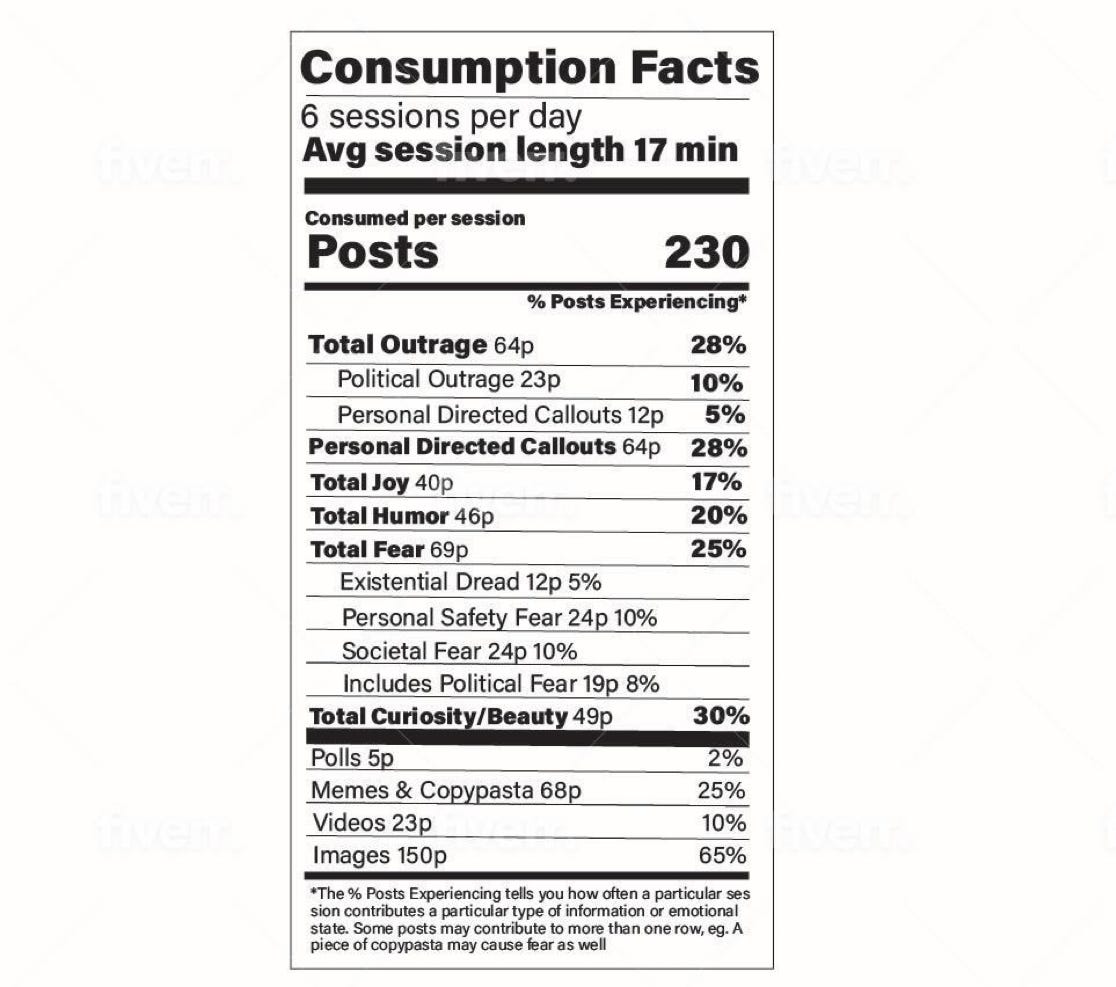What’s in Your Emotional Nutrition Label?
When Your Feed is Your Food
Tell me what you eat, and I will tell you what you are.
—Jean Anthelme Brillat-Savarin
I cannot remember the books I’ve read any more than the meals I have eaten; even so, they have made me.
—Ralph Waldo Emerson
Above: A mockup from Emmet Shear.
We’ve learned to read food labels, however imperfect they are.
Calories, fat, sugar, protein, et al allow for directionally correct (if imprecise) information. Without them, we’d be walking blind though grocery stores, bodegas, and fast food joints the world over.
What if our information intake worked the same way?
An old tweet from Emmett Shear lays this out nicely:
I [have] a vision of a future where our information intake is made legible to us, the way food labels make our nutrition legible. Which is to say, imperfectly but still usefully.
Imagine following someone, but before you do checking to see how much righteous outrage they’ll add add to your daily dose. Not all outrage is bad, just like not all sugar is bad…but too much is too much!
Garbage In, Garbage Out
AI has made this even more urgent. With an internet chock full of slop, contagion, and generative garbage, your information diet is not metaphor, but input. And, in a world where the gap between imagination and execution has all but disappeared, input is everything.
To paraphrase Winston Churchill, never before has so much crap consumed by so many been created by so few:
If our feeds are high-fructose outrage syrup, then our thoughts, decisions, and creative work will carry the same glycemic crash.
Tools on the Horizon
This is neither sponsored nor endorsed, but it’s worth sharing: a Chrome extension called Twitter Nutrition Facts. It classifies the types of tweets you consume, and even lets you block categories wholesale.
If the tool works (I’ve just discovered it), it’s the start of something important, bold, and new.
Think Oura or Whoop, but for your media metabolism. A dashboard of respiration, sleep, recovery, HRV but applied to your most precious gift: your mind.
A New Psychographic Frontier
This is more than a nifty trick, but an important way to measure, per Marshall McLuhan, how the tools we shape evolve to shape us. We’ve tracked our steps, our sleep, our sugar intake; why not our daily outrage-to-joy ratio?
The best information diet is still the oldest: put down the screen and pick up a book. Nothing beats long-form, deliberate reading for recalibrating the mind and silencing the soul.
Here are a few books I deem exceptional.
Barring that, at least pay attention to what you’re feeding yourself online. Because just as too much sugar makes the body sick, too much outrage, irony, or cynicism can leave us emotionally diabetic, spiritually starved, and intellectually stunted.
Per my about page, White Noise is a work of experimentation. I view it as a sort of thinking aloud, a stress testing of my nascent ideas. Through it, I hope to sharpen my opinions against the whetstone of other people’s feedback, commentary, and input.
If you want to discuss any of the ideas or musings mentioned above or have any books, papers, or links that you think would be interesting to share on a future edition of White Noise, please reach out to me by replying to this email or following me on Twitter X.
With sincere gratitude,
Tom




Iam intrigued by the idea of having labels for posts too, but the caveat is many accounts will end up dead because the world of content has so many dynamics and is difficult to be regulated to have quality checks ans certifications.